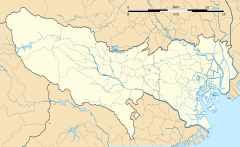|
Asakusabashi Station
Asakusabashi Station (浅草橋駅, Asakusabashi-eki) is a subway station on the Toei Asakusa Line operated by the Tokyo Metropolitan Bureau of Transportation, and a railway station above ground level on the Chūō-Sōbu Line at the same site operated by the East Japan Railway Company (JR East). It is located in the Asakusabashi neighborhood of Taitō, Tokyo, Japan. Its number on the Asakusa Line is A-16. Station layoutJR platforms
JR Asakusabashi Station has two side platforms with two tracks between them. Platform 1 is for passengers going toward Akihabara and Mitaka Stations. Platform 2 serves those bound for Kinshichō and Chiba Stations.
Toei platforms
Underground, the Asakusa Line station has an island platform between the two tracks. Trains on Platform 1 go toward Nihombashi and Nishi-magome Stations, while those on Platform 2 depart for the terminal of the subway line at Oshiage Station; through trains continue onward from there.
HistoryAsakusabashi opened on July 1, 1932, as a station on the Sōbu Line. On December 4, 1960, the subway station on what was then known as Toei Line 1 began to operate.[citation needed] On November 28, 1985, Asakusabashi Station was firebombed by masked members of the Revolutionary Communist League, National Committee,[1] who claimed that this action, as well as other acts of sabotage committed across several prefectures the same day were to support the 24-hour strike by the labour union Doro-Chiba protesting against the impending privatisation of Japanese National Railways (JNR).[2][3] This incident did not affect operations on the Toei Asakusa Line as the underground platforms were not targeted.[citation needed] 48 persons were arrested during an investigation.[4] Surrounding areaThe station serves the neighborhood. Nearby are the Lycée Franco-Japonais de Tokyo, the Kanda River, and the Sumida River. The former Yanagibashi geisha quarter was located to the south of the station. See alsoReferencesThis article incorporates material from 浅草橋駅 (Asakusabashi-eki) in the Japanese Wikipedia, retrieved on December 15, 2007.
35°41′49″N 139°47′10″E / 35.697°N 139.786°E Wikimedia Commons has media related to Asakusabashi Station. |
||||||||||||||||||||||||||||||||||||||||||||||||||||||||||||||||||||||||||||||||||










